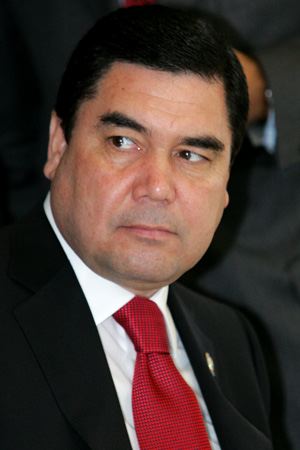A CALL FOR ACCESS TO TURKMENISTAN
September 29, 2009
Foreign diplomacy and business should be accompanied by improvements in the civil sector.
On September 24 2007, Turkmenistan’s president, Gurbanguly Berdymukhamedov, gave a speech at Columbia University in New York City. During a round of questions after his speech, he was asked why foreign NGOs are not allowed access to the country.
President Berdymuhamedov’s response spurred careful optimism that promised reforms in the sphere of human rights might be real : “Please, this is not an issue”, he said. “There are no restrictions”.
this is not an issue”, he said. “There are no restrictions”.
At the time of this writing, Berdymukhamedov has been in power for two and a half years, ample time to conclude that the promises made that day at Columbia have not been fulfilled.
Following the death of former President Saparmurat Niyazov, the frequency of visits by Westerners to Turkmenistan has greatly increased. Visits by foreign diplomats and representatives of multinational companies in the hydrocarbon sector have become commonplace in the Turkmen capital, Ashgabat.
While increased openness and a higher level of contact between the country and the outside world is a step ahead, one segment of the international community has been systematically denied access to Turkmenistan.
Over the years, representatives of organisations working to safeguard fundamental human rights have made numerous unsuccessful attempts to obtain visas for official visits to assess the human rights situation in the country.
Though human rights organisations have not been allowed to conduct independent research on the situation in Turkmenistan, information coming out of the country describes a society still very much in the grip of a repressive government, where people are denied the most basic rights and freedoms.
According to local sources, Turkmenistan under Berdymukhamedov is one of only a handful of countries in the world that still limits freedom of movement, routinely preventing certain individuals from travelling outside of its borders. So-called ‘black lists’ are still in place, based on which Turkmen citizens are frequently refused permission to leave the country.
Reports from inside Turkmen prisons speak of torture, ill-treatment and deplorable conditions. Many prisoners have been sentenced in closed trials, with little or no chance of defending themselves against illfounded accusations. The lack of access to Turkmenistan makes it difficult to estimate the number of political prisoners, but it is likely to be substantial.
The media remain completely under the control of the government, and many people in Turkmenistan know little of what happens either inside or outside of the country.
The strengthening of diplomatic and business contacts has not, as some hoped, led to improvements in fundamental rights of people in Turkmenistan. We, the signatories, call upon governments and commercial companies to use their access to Turkmen authorities not only for commercial interests, but also to improve the lives of the over 5 million Turkmen citizens living under this government, and to call for access to Turkmenistan by international civil society and human rights organisations.
We call upon international organisations such as the United Nations and the European Union to do the same.
Access to Turkmenistan for independent human rights organisations is a necessary part of the international community’s growing engagement with that country. To promote such access is a moral obligation.
Respectfully,
Bjørn Engesland, Secretary General, Norwegian Helsinki Committee, Oslo.
Robert Hårdh, Executive Director, Civil Rights Defenders, Stockholm.
Antonio Tricarico, Coordinator, CRBM, Rome.
Kate Watters, Executive Director, Crude Accountability, Alexandria, VA.
Sebastien Godinot, Campaigns Coordinator, Friends of the Earth, Montreal.
Gavin Hayman, Campaigns Director, Global Witness, London.
Maria Dahle, Executive Director, Human Rights House Foundation, Oslo.
Valentin Gefter, Director, Human Rights Institute, Moscow.
Holly Cartner, Europe and Central Asia director, Human Rights Watch, New York.
Don Steinberg, Deputy President for Policy, International Crisis Group, Brussels.
Oleg Orlov, Chairman of the Board, Memorial, Moscow.
Anthony Richter, Associate Director OSI/Director of Central Eurasia Project, Open Society Institute, New York.
Kjell Magne Bondevik, President, Oslo Center for Peace and Human Rights, Oslo.
Farid Tukhbatullin, Director, Turkmen Initiative for Human Rights, Vienna.
Knud Voecking, Program Director, Urgewald, Sassenberg.


